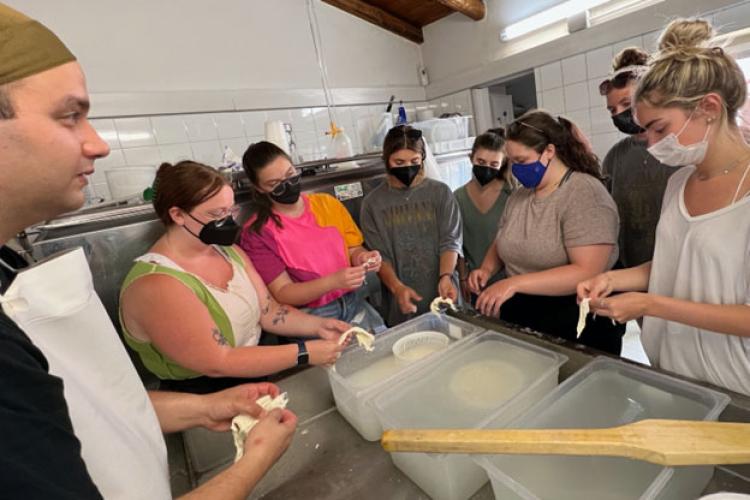
Food In Sicily students discover the power of community resilience

The Food in Sicily "Maymester" program is not just a way for students to discover the delicious tastes of Sicilian food — arancini, cannoli, caponata, bottarga, cassata, granita, and many more, it is an experience aimed at providing a look into why these foods matter in Sicilian culture.
“An important aim of this study away program is to understand the cultural significance of these foods to Sicilian society. And the preparation of these traditional foods can often be seen as a way of healing and fortifying not only one’s physical health, but also the health of the community and even of the land itself,” Theresa Moran, Ph.D., Food in Sicily instructor, said.
Moran invites students to learn more about how they can study the relationship of food and society in May 2023 through information sessions this fall via Teams.
The information sessions will be held on:
- Thursday, Oct. 20, at 7:30 p.m.
- Thursday, Nov. 17, at 7:30 p.m.
- Thursday, Dec. 15, at 7:30 p.m.
For example, Moran said, students in past years learned from master cheesemaker Giuseppe Selvaggio that the transformation of Sicilian milk into various cheeses — fior di latte, ricotta, provole and caciocavalli — is not just a miracle of fermentation that has his customers lining up at his shop Caseificio Selvaggio in Priolo Gargallo, Siracusa, but also part of a process that may contribute to reclaiming this most polluted part of Sicily, known as "Trinacria nera."
"Trinacria nera," or black Sicily, refers to the industrial pollution caused by the oil-refining industries like ExxonMobil that located along the southeastern coast following World War II. This area, historically among the poorest parts of Italy, was transformed into the largest petrochemical complex in Europe. The industry brought much-welcomed economic development and job security to thousands of Sicilians, including Selvaggio’s grandparents. But that prosperity came at a devastating environmental cost.
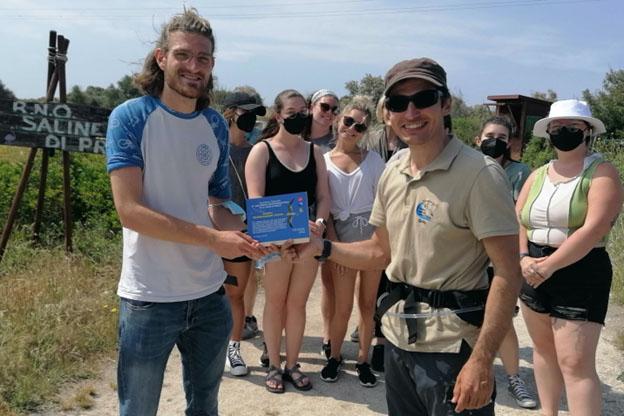
Flamingoes and the Saline di Priolo Nature Reserve
Efforts to combat pollution from the oil refineries began in 2000. Notable among these efforts was the establishment of the "Saline di Priolo" nature reserve a few miles from Selvaggio’s cheese shop. Salt flats and a coastal dune habitat once extended for kilometers and were praised by ancient authors such as Virgil, Ovid, and Thucydides as places of immense beauty. Community groups in the nearby city of Siracusa came together to create the nature reserve to safeguard and maintain this once-flourishing paradise of aquatic biodiversity.
"The reserve is located in a large wetland area, now the home of 216 species of birds and an increasing number of nesting flamingoes. Unfortunately, recent drought caused such low water levels in the wetlands that the flamingoes were deterred from nesting there, which meant that in May 2022 when the Food in Sicily students visited, no flamingoes were present. The drought conditions are a stark reminder that the fight against the pollution of the Trinacria nera needs to go far beyond just the petrochemical complexes in the area," Moran said.
Despite the disappointment of not seeing the flamingoes, students were still able to have fun on the Saline di Priolo beach. Oil refinery smokestacks dot the skyline of this sandy beach, one of the longest in Sicily. Now clean enough for swimming thanks to community conservation efforts and anti-pollution regulations, the sea here was once red with the release of chemicals from the refineries.
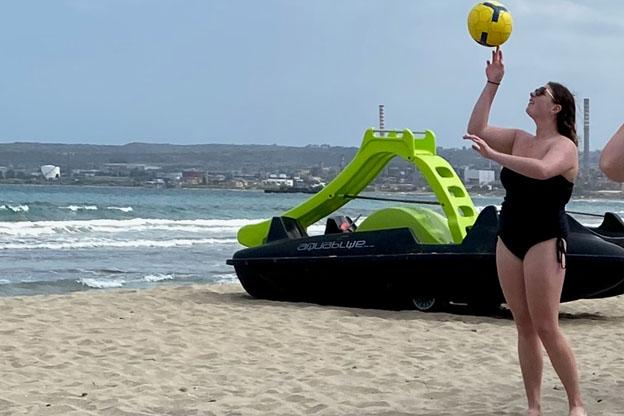
Passion and Resilience: Protecting Delicious Traditions
The message on the chalkboard outside Selvaggio’s shop encourages customers and passersby to remain resilient and hopeful.
"It’s an old Sicilian saying which reminds us that we can get through difficult times with the expectation of better things to come—a cry for resilience and courage during the challenging COVID years, as well as the call to continue reclamation efforts to restore nature through the healing power of community action," said Moran, who noted that there are many food artisans in this part of Sicily who are working to restore the cultural, environmental and economic health of the island, both through strengthening regional agriculture and reviving Sicily’s food traditions.
Corrado Assenza of Netflix's "Chef’s Table" fame and owner of Caffè Sicilia in Noto, just an hour from Siracusa and a place Food in Sicily visits ever year, has helped revitalize local agriculture by encouraging farmers to grow traditional fruits, berries, and grains for his pastries, gelato, jams, and granita.
Assenza has especially dedicated himself to restoring the Sicilian almond tree—almonds are an essential ingredient in Sicilian desserts. Under threat from more commercial varieties, the Sicilian almond tree requires one-third less water than other varieties and is a critical part of the island’s biodiversity.
A fellow Sicilian artisan baker, much lauded for his ethereal brioche and deeply flavorful granita, Franco Manuele of Nuova Dolceria in Ferla and Siracusa, writes about the strong connection between his products and his mountain hometown, less than an hour’s drive from coastal Priolo. The town of Ferla, he writes, “is uncontaminated nature … always attentive to … the cadenced rhythm of natural cycles and seasons….” His pastries draw on the more than a hundred years of traditions in the town and are inspired by the agricultural bounty and flavors of the area.
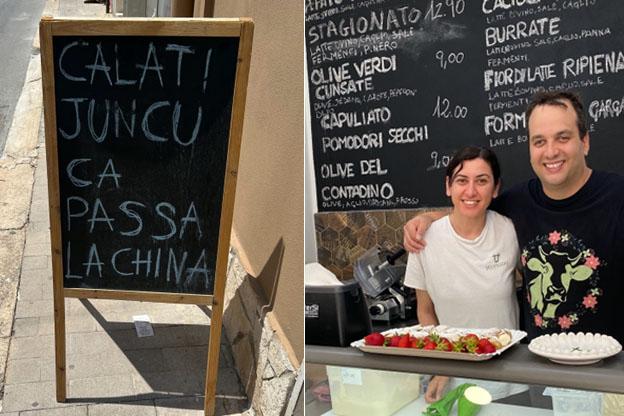
Similarly, Selvaggio wants to preserve the typical Sicilian production of dairy products. Using only the milk of grazing animals, he strives to produce the best possible products based on authentic recipes. But the master cheesemaker noted, “We are always looking to innovate with new products, while keeping ourselves rooted in what is the ancient craft of cheese making."
Every morning Selvaggio turns milk into cheese in the very place where his grandparents lived during the boom years of the petro-chemical industry. He set up his shop in the same location in order to reclaim his family ties to the town.
“Making cheese was one of my favorite days of the trip,” said Food in Sicily student Maya Roth-Wadsworth, now a junior majoring in sociology in the College of Arts and Sciences. “It was exactly the type of hands-on experience I was hoping for when first applying for this program. It was very tiring, but it felt very rewarding at the end to be able to eat some of what we made and see customers come in and buy it fresh. It was inspiring and made me happy to see how passionate the owner was about his business, his family, and making quality food. I love seeing people who genuinely love what they do and love talking about and teaching people their passions.”
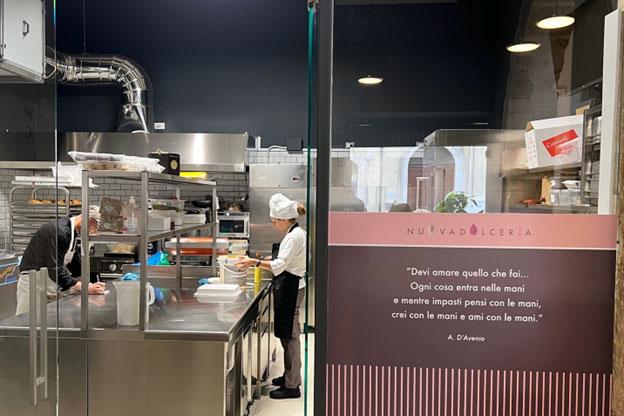
On the window of Nuovo Dolceria’s shop in Siracusa is a quote from Sicilian writer Alessandro D’Avenia, a quote which applies to all the artisans the students meet with and whose delicious handiwork they enjoyed: “Devi amare quello che fai… Ogni cosa entra nelle mani e mentre impasti pensi con le mani, crei con le mani e ami con le mani.” You have to love what you do...Everything goes through your hands and while you knead, you think with your hands, you create with your hands, and you love with your hands.
About Food in Sicily, May 10-30, 2023
For more information about the Food in Sicily "Maymester" program, contact David Bell, director of the program and also chair of Linguistics in the College of Arts and Sciences, at belld@ohio.edu.
